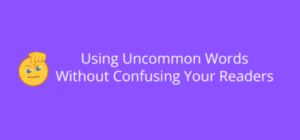“Unlocking the Secrets of Language: How Etymology Can Clear Up Common Confusions and Transform Your Vocabulary!”
Have you ever found yourself tangled in the web of word confusion, desperately questioning whether you’re “blameworthy” or “culpable”? Or perhaps you’ve hesitated between using “blandish” or “brandish,” wondering which one will suit your sentence best? You’re certainly not alone! These moments of uncertainty can feel like navigating a verbal minefield. In this article, we dive into the nuances of commonly confused terms, offering clarity and insight that can elevate your writing. With a blend of etymology and practical examples, we’ll explore when to deploy “blatant” instead of “flagrant” and much more. Let’s unravel the complexities of language together and turn confusion into mastery! Ready to enhance your linguistic skills? LEARN MORE.

WRITING WELL
And when to use “blameworthy” vs. “culpable,” “blandish” vs. “brandish,” or “blatant” vs. “flagrant” in your writing
I always have to stop and make sure I’m using either “hilarious” or “hysterical” correctly as my default is to say something like, “That’s hysterical” when what I really mean is, “That’s hilarious.” Writing a post about these two commonly confused words isn’t actually a novel idea, though, as explanations abound online. An important one that really drives the point home based on etymology alone is “Why You Should Stop Using the Word ‘Hysterical’ to Mean ‘Hilarious’” by Edward John.
Luckily the English language never fails to present new topics worth exploring, especially when it comes to commonly confused words and their histories. As I’ve noted before, I never fail to learn something new from one of my favorite resources, Garner’s Modern English Usage by Bryan Garner. Commonly confused words are commonly tackled by Garner, and simply opening to a random section of his alphabetical list of entries reveals a number of lessons on that front. Such lessons also come complete with detailed explanations of the etymology of discussed words. The following are all within a few…












